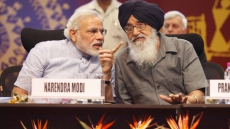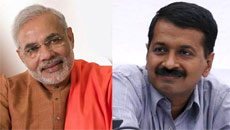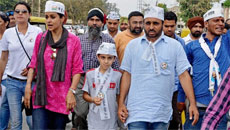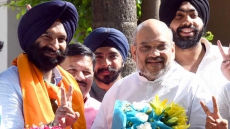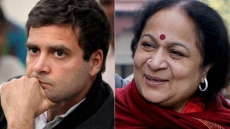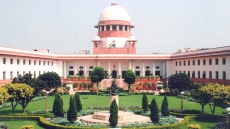The central government and the National Socialist Council of Nagaland-Isak-Muivah on Monday signed a historic accord that promises to bring peace in the northeastern state ravaged by violence for over six decades. Various stakeholders welcomed the move, saying it will bring a new dawn of peace and development.
Prime Minister Narendra Modi said the accord was an inspiration in "our troubled world", and not only marked the "end of a problem, but the beginning of a new future".
"Today's agreement is a shining example of what we can achieve when we deal with each other in a spirit of equality and respect, trust and confidence; when we seek to understand concerns and try to address aspirations; when we leave the path of dispute and take the high road of dialogue. It is a lesson and an inspiration in our troubled world," he said.
He said the Naga political issue had lingered for six decades, "taking a huge toll on generations of our people".
"It is a legacy of the British rule. The colonial rulers had, by design, kept the Nagas isolated and insulated. They propagated terrible myths about Nagas in the rest of the country," he said.
"The respect for the infirm and elders, the status of women in society, sensitivity to Mother Nature, and the emphasis on social equality is a natural way of Naga life. These are values that should constitute the foundation of the society that we all seek."
NSCN-IM general secretary Thuingaleng Muivah, who signed the accord at the ceremony held at the Modi's 7 Race Course Road residence, hailed it as a "momentous occasion".
"Under Narendra Modi, we have come close to understanding each other and have worked out a new relation" with the government, he said, adding that the Naga people have great respect for Mahatma Gandhi.
Muivah, 81, is a key leader of the NSCN-IM which has been in talks with the government since 1997 after a ceasefire agreement was signed.
NSCN-IM chairman Isak Chishi Swu could not make it to the ceremony as he is unwell and undergoing treatment at Fortis hospital in Delhi. His son Pasheto was, however, present.
Meanwhile, various stakeholders in the peace process cautiously welcomed the accord.
While congratulating Modi, Nagaland Chief Minister T.R. Zeliang told IANS: "This positive development will pave the way for a permanent solution acceptable to the Nagas."
"Our people have been struggling for more than six decades for a settlement to the Naga issue, and the signing of the peace accord is a welcome step towards such a settlement," he said.
The Naga Hoho, the apex body of all Naga tribes of Nagaland, welcomed the accord but said it needed to see the contents of the deal before further commenting on it.

"We are happy and welcome the accord but we need to see its contents before making further comments," Naga Hoho president P. Chuba Ozukum told IANS.
Asked how effective the deal would be given that it was signed with the NSCN-IM, while the NSCN-Khaplang faction abrogated its ceasefire with the government in March this year, Ozukum said S.S. Khaplang was being asked to renew the ceasefire.
"We are still requesting Khaplang to renew the ceasefire. We are trying to make him understand," he said.
Naga People's Movement for Human Rights (NPHMR) chairman N. Krome told IANS they were all "caught by surprise by the sudden announcement".
Thangso Baite, the Congress Lok Sabha member from Outer Manipur, welcomed the peace accord, but said it should not affect the neighbouring states.
"We were anxiously awaiting the peace accord provided it does not affect the neighbouring states," the MP from a constituency that has a large Naga population and is home to Muivah's Tangkhul Naga tribe told IANS.
Former Mizoram chief Minister Zoramthanga, who was successful in brokering peace between the centre and the NSCN-IM, also congratulated the government and the Naga leaders on signing the peace accord.
"... I am sure both the parties signed an agreement which is acceptable to them," Zoramthanga, who was once a militant leader of the rebel Mizo National Front before the outfit surrendered in 1986 and entered the political mainstream, told IANS over phone from Mizoram capital Aizawl.
Nagaland became India's 16th state on December 1, 1963. The mostly mountainous state is spread over 16,579 square km and is home to 16 major tribes, each with distinct customs, language and dress. Christian-dominated Nagaland is home to around 20 million people. Its official language is English.
Modi later in the day spoke to various political leaders including Congress president Sonia Gandhi, former prime ministers Manmohan Singh and H.D. Deve Gowda, Chief Minister Zeliang, Leader of Congress in Lok Sabha Mallikarjun Kharge, Samajwadi Party chief Mulayam Singh Yadav and Janata Dal-United chief Sharad Yadav.
He also spoke to Communist Party of India-Marxist leader Sitaram Yechury, Bahujan Samaj Party's Mayawati, Nationalist Congress Party's Sharad Pawar, Tamil Nadu Chief Minister J. Jayalalithaa and West Bengal Chief Minister Mamata Banerjee.

